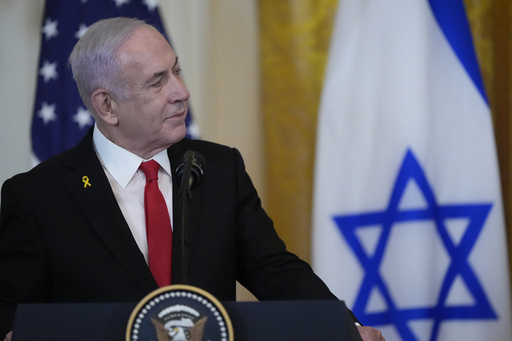WASHINGTON – At a recent joint press conference with Israeli Prime Minister Benjamin Netanyahu, President Donald Trump’s statements stirred controversy as he floated the idea of permanently relocating Palestinian refugees from the Gaza Strip and hinted at a potential long-term U.S. takeover and redevelopment of the region into a sought-after paradise. He even suggested that the U.S. might deploy military personnel to facilitate these plans and expressed a personal interest in visiting the area himself, embodying his identity as a real estate developer.
Trump’s bold assertions could significantly disrupt the fragile ceasefire negotiations between Israel and Hamas. These discussions are intended to sustain the ceasefire and aim for the release of remaining hostages, including at least one American citizen. His proposal to resettle approximately 1.8 million Palestinians from their homeland poses a serious threat to these negotiations, which are already centered on delivering humanitarian aid and rebuilding efforts following the extended conflict. The prospect of Hamas relinquishing its governance in Gaza is a daunting challenge for mediators, and Trump’s notions of U.S. territorial claims will likely be met with staunch opposition from the group. This also jeopardizes the roles of Qatar and Egypt, who have historically supported Palestinian self-determination.
Responses to Trump’s comments were swift and overwhelmingly negative across the Middle East. Saudi Arabia explicitly rejected any attempts to displace the Palestinian population, reaffirming its commitment to Palestinian statehood. The country, currently in talks with the U.S. regarding potential diplomatic recognition of Israel, underscored that the international community’s priority should be alleviating the suffering of the Palestinian people, who remain deeply tied to their land. Similarly, Hamas condemned Trump’s remarks, describing them as incendiary and capable of exacerbating tensions in the area.
Interestingly, Trump, who has cultivated an isolationist political persona, indicated a readiness to deploy U.S. troops to Gaza, a striking shift from his usual “America First” rhetoric. He advocated for a long-term U.S. ownership approach to the region, asserting that necessary measures will be taken, including military involvement if deemed essential. Such a stance stands in stark contrast to his overall reluctance to engage in foreign military conflicts.
During the news conference, Trump demonstrated his real estate developer mindset, envisioning a redeveloped Gaza as a luxurious destination, likening it to the “Riviera of the Middle East.” He expressed optimism about transforming the region into a valuable, beautiful place, promising peace for its inhabitants. Trump revealed plans to visit Israel during a prospective second term, suggesting that a trip to Gaza could also be on the agenda, which would pose significant logistical and security hurdles.
Meanwhile, Trump has shown hesitance regarding his administration’s approach to Iran. He expressed a desire for peaceful negotiations with the country, as long as it agrees to forgo nuclear weapons development. His recent tone, which included directly addressing Iranians and acknowledging their potential, starkly contrasts his previous tough stance toward American allies.
In light of his comments about Gaza, Trump’s tendency to assert U.S. control over regions is raising eyebrows. His remarks about possibly occupying Gaza and comparisons to previous comments about the Panama Canal and Greenland have led some to question his judgment. Senator Chris Murphy from Connecticut did not hold back in his criticism, labeling Trump’s Gaza assertions as dangerously misguided and alarming, indicating that they could lead to deepening instability in an already volatile region.



